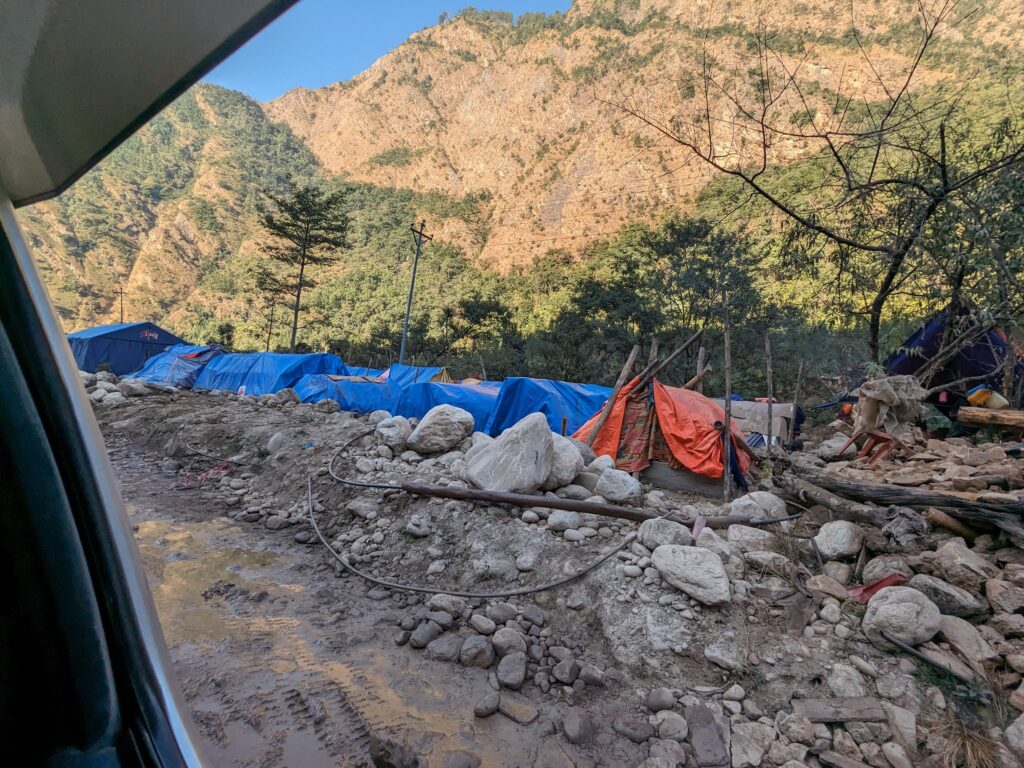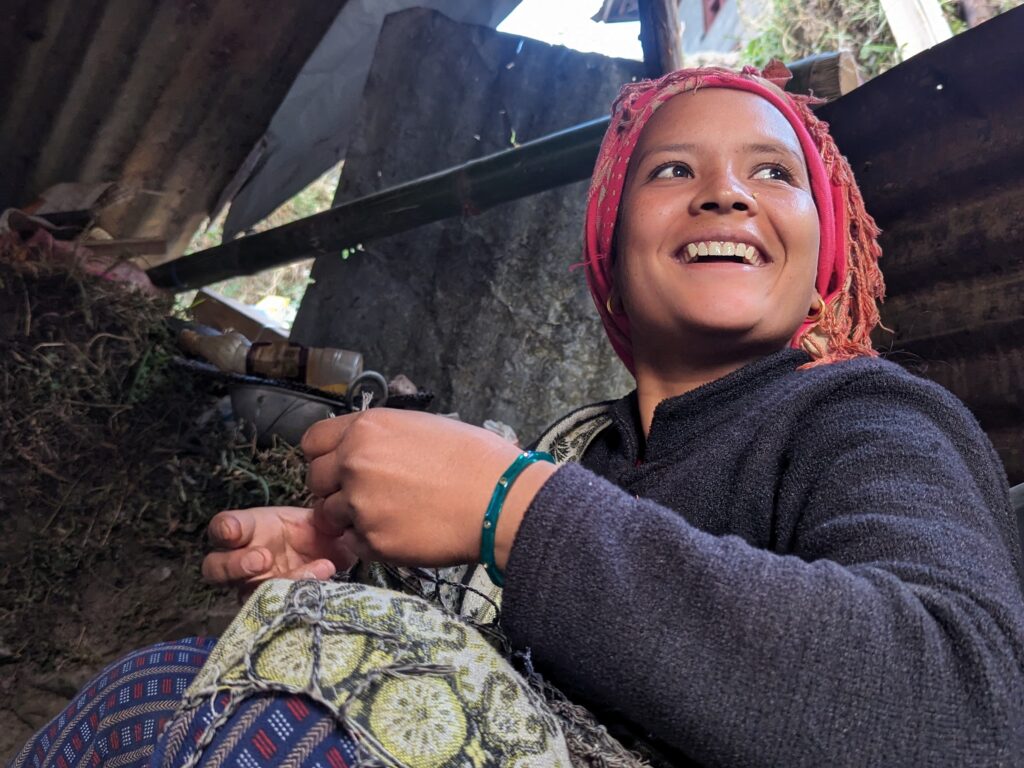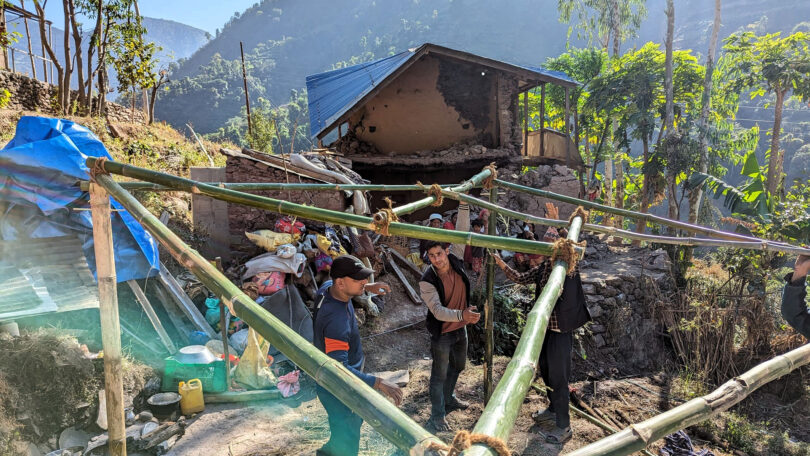Jajarkot, Nepal – A month after a devastating 6.4-magnitude earthquake struck the district of Jajarkot, volunteers from the RSK Shelter organization, Mr. Laxmi Prasad Acharya, Mr. Bishnu Prasad Acharya, and Mr. Sarad Joshi, the team leader of the RSK Response Team, have been at the forefront of relief efforts in the affected areas. The team, which included international volunteers such as Shaun Halbert, a 71-year-old British citizen and founder of RSK Shelter, has been working tirelessly to provide emergency shelters and essential supplies to the victims.
Upon arrival in Nepalgunj, the team quickly mobilized to gather relief materials, facing skyrocketing prices and logistical challenges. “The local market was an eye-opener, revealing price hikes of up to 20% from regular days,” the team noted, highlighting the struggle to secure necessary supplies amidst the chaos caused by the disaster.

The focus of the volunteer efforts has been on building emergency shelters, especially targeting vulnerable groups such as pregnant women and those in post-maternity phases. Despite the challenges, including a shortage of accommodation due to the high influx of rescue and relief workers, the team provided critical support to the communities in Nalgad, an area particularly hard-hit by the quake.
In a significant expansion of their mission, the RSK Shelter team embarked on the second phase of their emergency shelter program, venturing into Kushe Rural Village in Ward-4, a location previously unreached by organizations with shelter programs.

The team, compelled to stay in rescue tents due to the lack of hotels and guest houses, constructed 25 shelters to protect around 120 lives. They also distributed relief materials, school supplies, and warm clothes to a local primary school, working under devastating conditions alongside the local public.
“Reaching Kushe Rural Municipality and the shelter location was a tough task,” Mr. Joshi remarked, highlighting the logistical challenges faced by the team in their efforts to extend aid.
The disaster claimed 154 lives and caused extensive damage to infrastructure, including 213 school buildings in Jajarkot alone. Many schools are now holding classes in tents, a testament to the resilience of the local communities but also a stark reminder of the long road to recovery ahead.

As the team journeyed through the devastated areas, the extent of the destruction became more apparent. “We encountered families living under thin plastic sheets next to cattle sheds, their homes uninhabitable,” the team shared, painting a grim picture of the living conditions for many in the aftermath of the quake.
One of the significant obstacles to relief efforts has been the bureaucratic delays and the mismanagement of aid distribution, with relief materials stuck in bottlenecks and not reaching those in need. Mr. Joshi’s team, however, witnessed a different scenario during their week-long trip, with substantial efforts made to distribute aid more effectively.
Despite these efforts, challenges remain, including inadequate clean water and sanitation facilities in temporary shelters. The earthquakes have also raised concerns about the structural integrity of local housing, emphasizing the need for adherence to seismic standards in building codes—a lesson painfully reinforced by the disaster.















The National Building Code, established by the federal government, sets standards for constructing houses in various seismic zones, but awareness and economic barriers have hindered its effective implementation.
“The building code in Nepal was introduced in 1994, but its effective implementation gained widespread recognition only after a major earthquake in April 2015,” the team remarked, underscoring the importance of preparedness and resilience in the face of natural disasters.
RSK Shelter is actively providing safe and effective shelters to earthquake victims, ensuring their safety amidst difficult post-quake conditions and harsh weather. Their shelters, designed for quick deployment, are robust, offering protection and privacy, particularly for vulnerable groups like newborns and their mothers.
Along with shelter, RSK distributes essential supplies such as warm clothing and hygiene kits, supporting immediate needs and local economies. This initiative reflects RSK’s commitment to helping communities recover and rebuild with dignity and safety.
In conclusion, the situation in Jajarkot and surrounding areas, including the outreach to Kushe Rural Village, highlights the ongoing need for support and the critical role of volunteers in disaster response. The far-west region of Nepal, already struggling with basic necessities, faces the added burden of rebuilding in the aftermath of the earthquake.
The efforts of Mr. Joshi and his team in constructing shelters and providing essential supplies are a beacon of hope, demonstrating the power of community and solidarity in times of crisis.

